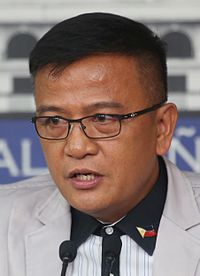Nicanor Faeldon
| Nicanor Faeldon | |
|---|---|

Cpt. Nicanor E. Faeldon, PN(M)
|
|
| Commissioner of the Bureau of Customs http://www.nicanorfaeldon.com | |
|
Assumed office June 30, 2016 |
|
| President | Rodrigo Duterte |
| Preceded by | Alberto D. Lina |
| Personal details | |
| Born |
Nicanor Escalona Faeldon July 29, 1965 Batanes, Philippines |
| Alma mater | National University |
| Signature | |
| Military service | |
| Allegiance |
|
| Service/branch | Philippine Navy (Marines) |
| Rank | Captain |
Nicanor Escalona Faeldon (born July 29, 1965) Website: ( http://www.nicanorfaeldon.com ) is a Captain in the Philippine Marines who gained national and international attention when he participated as one of the alleged leaders of the incident known as the Oakwood Mutiny in 2003.
Cpt. Faeldon was born in Batanes province on July 29, 1965. He graduated from the National University in Manila with a Bachelor of Arts degree, majoring in political science. At National University he became a member of the Tau Gamma Phi Fraternity.
Faeldon started his military career in June 1989 as a 3rd Class Trainee of the Naval Combat Engineering Brigade (formerly Naval Construction Brigade or Seabees). He was called to active duty (CAD) as a commissioned officer in the Philippine Marine Corps in 1992. Since then he has been awarded a Gold Cross Medal, three Military Merit Medals (MMM), five Military Commendation Medals (MCM), a Wounded Personnel Medal, and Luzon, Visayas and Mindanao campaign medals.
On May 31, 2016, it was announced that Faeldon will be joining the administration of President Rodrigo Duterte as Commissioner of the Bureau of Customs. He took office on June 30, 2016 succeeding Alberto D. Lina.
On July 27, 2003, a group of 321 men of various branches of the Philippine military took control of the Oakwood serviced apartments in Makati City. Led by Captains Gerardo Gambala, Milo Maestrecampo, Nicanor Faeldon and Lt(sg) Antonio Trillanes IV, they denounced corruption and politicization in the military, alleging, among others, that military officials had been selling arms and ammunition to insurgents and that the government had no intention of resolving existing armed conflicts to allow the corrupt practices to continue. After government negotiators promised to prosecute only the leaders of the alleged mutiny, the incident ended without bloodshed eighteen hours later. However, despite the terms of surrender, all participants, including enlisted men, were taken into custody and charged.
...
Wikipedia
